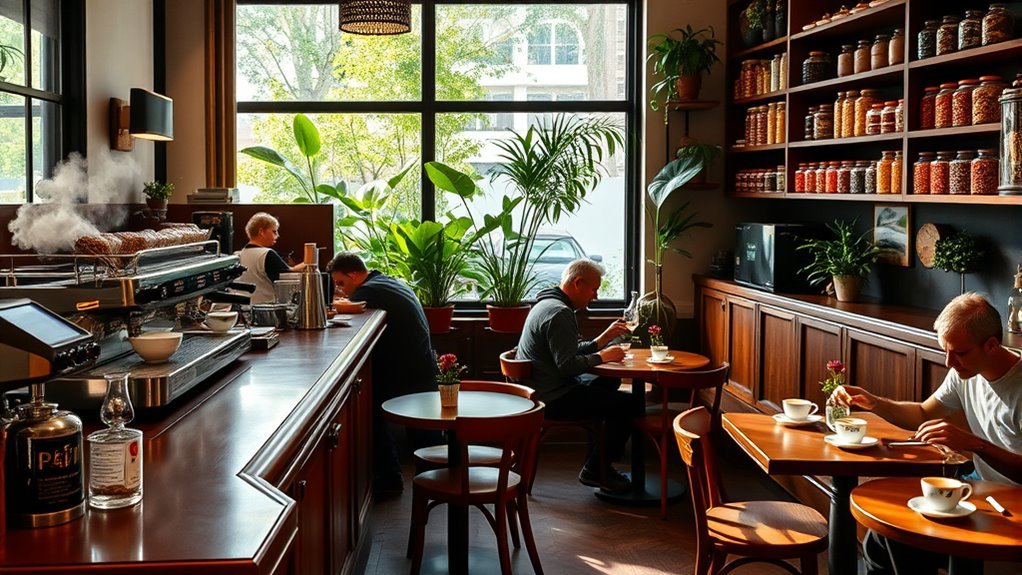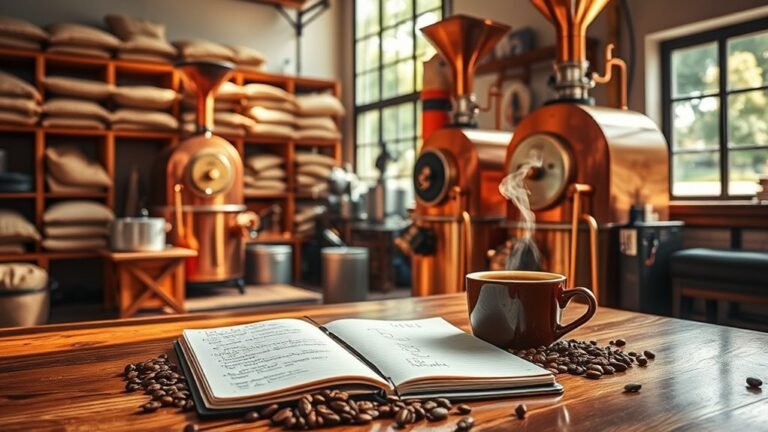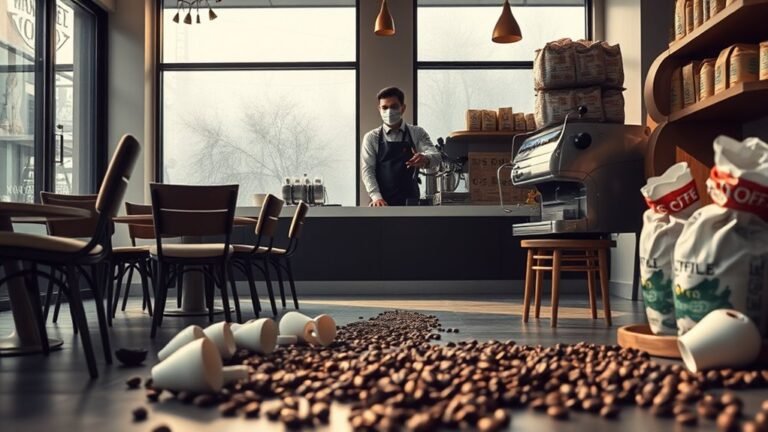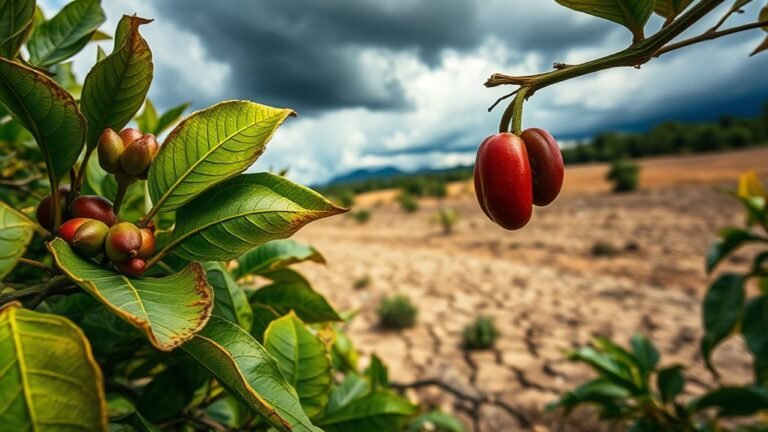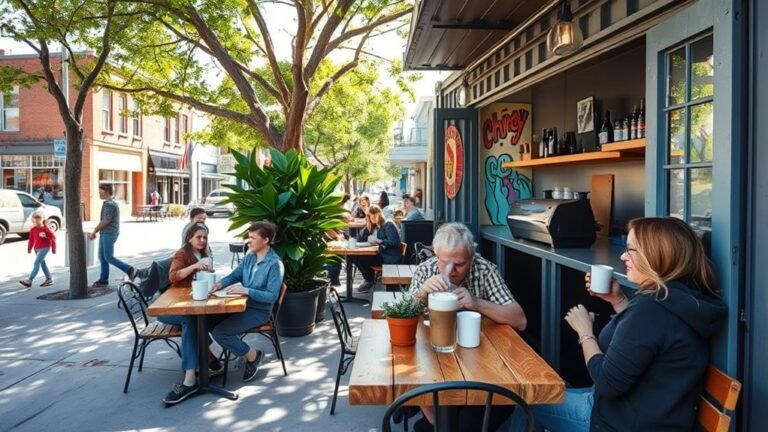The Rise of Specialty Coffee Shops
You’re seeing a surge in specialty coffee shops driven by your demand for quality, sustainability, and unique brews. Since the 1970s, this market has grown over 15% annually, focusing on artisanal craft and ethical sourcing that benefits farmers and ecosystems. These shops use precise brewing techniques to reveal distinct flavors while fostering local communities and culture. As technology and consumer preferences evolve, specialty coffee shops are reshaping how you experience coffee every day—explore what’s fueling this trend next.
What Defines Specialty Coffee?
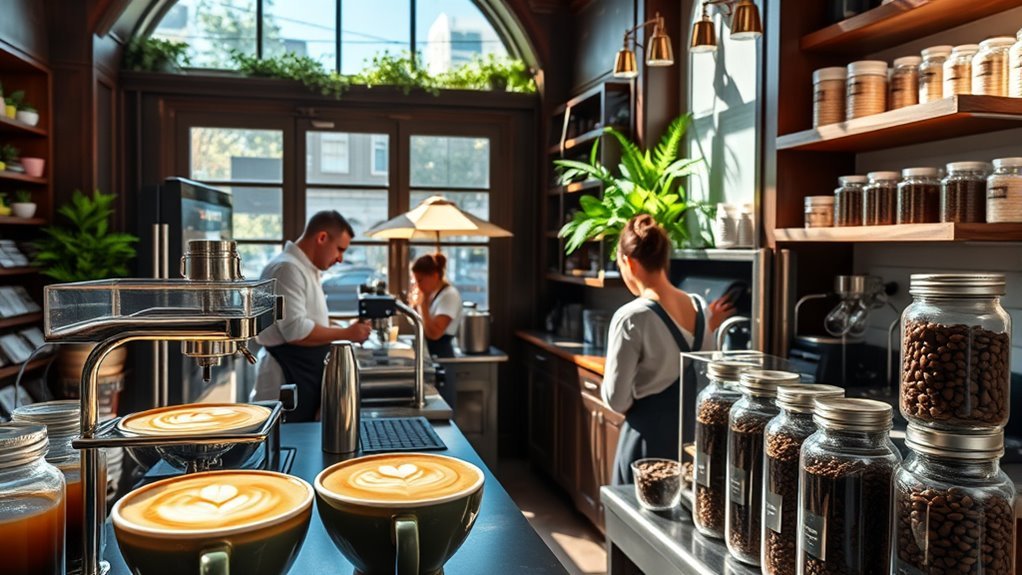
Specialty coffee is defined by a combination of quality, origin, and meticulous processing that sets it apart from standard coffee. When you explore specialty coffee, you’re tapping into unique flavor profiles that reflect the specific region, altitude, and cultivation methods. This isn’t just about taste—it’s about experiencing coffee as an artisanal craft. To fully appreciate it, you’ll need brewing precision: exact measurements, water temperature, and timing, all calibrated to highlight those distinct flavors. Industry data shows a growing demand for this level of customization, especially among consumers who value freedom to craft their perfect cup. As specialty coffee continues to rise, you’re empowered to move beyond generic blends and embrace a more personalized, data-driven coffee experience that reflects your taste and lifestyle.
The History and Evolution of Specialty Coffee Shops
Although coffee culture has long existed, the rise of specialty coffee shops over the past few decades reflects a significant shift in consumer preferences and industry standards. Since the 1970s, the specialty coffee shop market has grown at an average annual rate exceeding 15%, driven by consumers seeking higher-quality, unique coffee experiences. You’ll notice that these shops emphasize artisanal preparation and distinct flavor profiles, diverging sharply from traditional coffee outlets. This evolution mirrors broader market growth trends, where consumers prioritize authenticity and craftsmanship. By choosing specialty coffee shops, you’re tapping into a movement that values innovation and freedom from mass-produced coffee. Understanding this history helps you appreciate how the specialty coffee shop has transformed from niche to mainstream, reshaping both your daily ritual and the industry’s future trajectory.
The Role of Coffee Sourcing and Sustainability
Because consumers are increasingly aware of environmental and ethical impacts, coffee sourcing and sustainability have become central to the specialty coffee industry’s growth. When you choose specialty coffee, you’re supporting sustainable farming practices that protect ecosystems and empower farmers. Direct trade models, favored by many specialty shops, cut out middlemen and guarantee fair compensation. Key trends shaping this shift include:
- Increased transparency in supply chains, letting you trace beans back to the farm.
- Investments in eco-friendly farming methods reducing carbon footprints.
- Emphasis on social equity, improving farmers’ livelihoods.
- Certifications signaling commitment to ethical practices.
Brewing Techniques That Set Specialty Coffee Apart
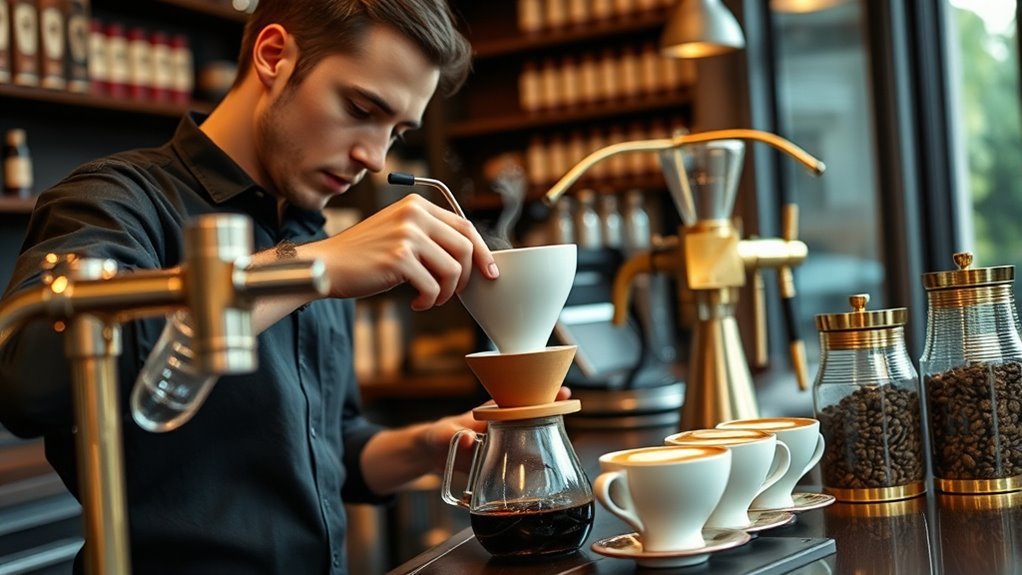
Understanding where your coffee comes from is just the beginning; how it’s brewed plays a huge role in revealing its full flavor potential. Specialty coffee shops excel through precise control of temperature, water quality, and grind size—key factors in brewing consistency. Whether you’re using pour over or cold brew, sensory evaluation guides flavor profiling, while espresso extraction demands meticulous attention to pressure and timing. Brewing gadgets today empower you to customize every step, releasing unique aromas and tastes.
| Technique | Key Factor | Impact on Flavor |
|---|---|---|
| Pour Over | Temperature control | Bright, nuanced notes |
| Cold Brew | Water quality | Smooth, low acidity |
| Espresso | Extraction timing | Intense, rich crema |
| Grind Size | Particle uniformity | Balanced extraction |
| Brewing Gadgets | Precision control | Enhanced consistency |
Mastering these elevates your coffee experience, giving you true freedom in flavor.
The Impact of Specialty Coffee on Local Communities
When specialty coffee shops thrive, local economies often see measurable growth through job creation and increased foot traffic. You’ll notice they’re more than just coffee spots—they’re community hubs that boost the local economy and strengthen social connections. Here’s how:
Specialty coffee shops fuel local economies by creating jobs, increasing foot traffic, and building vibrant community connections.
- Job Creation: Specialty shops often hire locally, providing stable employment.
- Foot Traffic: Increased visitors benefit neighboring businesses.
- Community Events: Coffee shops host gatherings, fostering social connections.
- Local Sourcing: Many prioritize local suppliers, circulating money within the economy.
Data shows that communities embracing specialty coffee experience a 15% rise in small business revenues. For you, this means more vibrant neighborhoods where freedom to connect and support local entrepreneurship flourishes. Specialty coffee isn’t just a drink—it’s an economic and social catalyst shaping your community’s future.
How Specialty Coffee Shops Influence Coffee Culture
You’ve probably noticed how specialty coffee shops are reshaping coffee culture through innovative brewing techniques that highlight unique flavors. Their commitment to ethical sourcing not only supports farmers but also sets new standards for transparency and quality. Plus, these shops often become community hubs, fostering connections that go beyond just a cup of coffee.
Brewing Techniques Innovation
Although brewing coffee might seem straightforward, specialty coffee shops have revolutionized the process by introducing precise techniques that emphasize flavor extraction and consistency. When you visit these shops, you’ll notice methods like cold brew and pour over gaining popularity, each allowing you to experience coffee’s nuanced profiles. Here’s how these innovations shape your coffee culture:
- Cold Brew: Extended steeping time produces smooth, less acidic coffee, perfect for freedom in flavor preferences.
- Pour Over: Offers control over water flow and temperature, revealing unique taste complexities.
- Precision Equipment: Digital scales and temperature-controlled kettles guarantee repeatable quality.
- Barista Expertise: Skilled brewing techniques tailor each cup to your desired taste.
These innovations empower you to savor coffee as an artisanal craft, not just a routine drink.
Ethical Sourcing Impact
Since specialty coffee shops prioritize ethical sourcing, they’re reshaping coffee culture by promoting sustainability and fair trade practices. You’re part of a growing movement where 70% of specialty shops now source beans directly from farmers, ensuring fair wages and environmentally sound methods. This shift boosts consumer awareness, empowering you to choose coffee that supports social equity and ecological balance. By demanding transparency, these shops push larger suppliers to adopt ethical sourcing standards. Data shows ethical coffee sales have surged 20% annually, reflecting your desire for products aligned with your values. As you sip, you’re not just enjoying quality; you’re fueling a global change that values freedom—freedom from exploitation and environmental harm. Your choices here influence industry standards and encourage a culture committed to responsibility and respect.
Community Engagement Roles
Building on the impact of ethical sourcing, specialty coffee shops also play an essential role in shaping community connections within coffee culture. You’ll find these shops actively fostering local partnerships and hosting community events that deepen cultural engagement. Here’s how they influence your coffee experience:
- Hosting educational workshops that empower you with brewing knowledge.
- Collaborating with local artists and businesses to create vibrant, shared spaces.
- Organizing community events like tastings and open mic nights that encourage social freedom.
- Supporting local causes through fundraisers, strengthening neighborhood ties.
This trend toward immersive community roles reflects a desire for meaningful interaction beyond the cup. As specialty coffee shops evolve, they’re not just places to grab coffee; they become hubs of cultural exchange and freedom, where you can connect authentically with both coffee and community.
Trends Shaping the Future of Specialty Coffee Shops
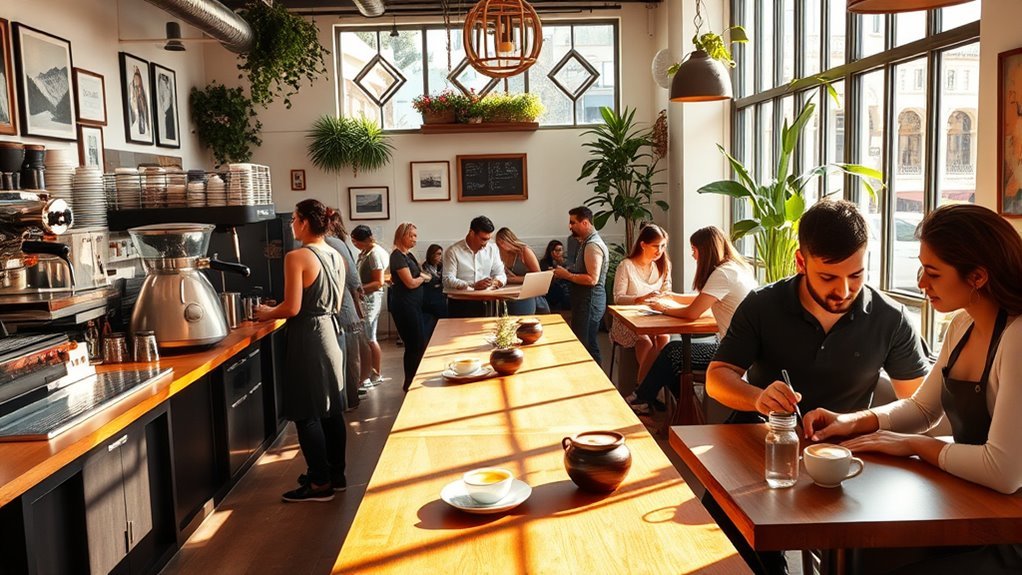
As consumer preferences evolve, specialty coffee shops are adopting innovative approaches to meet changing demands. You’re seeing a shift toward sustainability, tech integration, and personalized experiences—all essential in maneuvering market competition. Understanding customer preferences lets you tailor offerings that stand out.
| Trend | Impact on Shops | Customer Benefit |
|---|---|---|
| Sustainability | Reduced waste, ethical sourcing | Eco-friendly choices |
| Tech Integration | Mobile ordering, AI-driven recommendations | Faster, customized service |
| Personalized Experience | Unique blends, community events | Deeper connection, exclusivity |
Embracing these trends means you can foster loyalty and freedom in choice, ensuring your specialty coffee shop thrives amid fierce competition while aligning with what customers truly want.
Frequently Asked Questions
How Much Does It Cost to Open a Specialty Coffee Shop?
Opening a specialty coffee shop is like planting a seed—you need the right resources to help it grow. Your startup expenses typically range from $80,000 to $250,000, covering equipment, rent, and permits. Funding options include personal savings, small business loans, or investors who believe in your vision. Staying aware of market trends and consumer preferences can help you cultivate a thriving business that offers both financial freedom and creative satisfaction.
What Equipment Is Essential for a Specialty Coffee Shop?
You’ll need top-tier espresso machines as they’re essential for crafting high-quality shots, which 85% of specialty shops rely on. Investing in versatile brewing methods like pour-over and cold brew setups allows you to cater to evolving consumer preferences, boosting sales by up to 30%. Don’t forget grinders, scales, and water filtration systems—precision tools that give you control and freedom to experiment, ensuring every cup is consistently exceptional and trend-worthy.
How Do Specialty Coffee Shops Train Their Baristas?
Imagine learning barista skills like a blacksmith mastering their craft centuries ago. Today, you’d immerse yourself in Barista Certifications that provide structured knowledge and hands-on practice. You’ll explore Coffee Brewing Techniques from pour-over to espresso, guided by industry experts. This training emphasizes precision and creativity, letting you break free from routine and innovate. Data shows certified baristas boost customer satisfaction by 30%, proving that mastering these skills truly sets you apart in the coffee world.
What Are the Common Challenges Faced by Specialty Coffee Shop Owners?
You’ll often face challenges like staff retention, as skilled baristas seek growth or better pay elsewhere, making it tough to maintain consistency. Building customer loyalty is another hurdle, especially with rising competition and evolving tastes. Data shows shops focusing on personalized experiences and ongoing staff training retain more customers and employees. Embracing these trends gives you the freedom to create a thriving environment where both your team and clientele stay engaged long-term.
How Do Specialty Coffee Shops Market Themselves Effectively?
Did you know 73% of specialty coffee shops see increased sales through social media marketing? To market yourself effectively, you’ll want to harness platforms like Instagram and TikTok for genuine customer engagement. Sharing behind-the-scenes content, user-generated posts, and interactive stories helps you build a loyal community. Staying on top of digital trends lets you connect authentically, giving your brand freedom to grow while keeping customers excited and involved.
